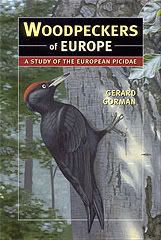 Adult female White-backed Woodpecker lilfordi race. Photo taken by Paul Harris at a nest-site in the Abruzzo Mountains, Italy.
Adult female White-backed Woodpecker lilfordi race. Photo taken by Paul Harris at a nest-site in the Abruzzo Mountains, Italy.
Sunday, 30 November 2008
Gallery: White-backed Woodpecker adult female lilfordi race
 Adult female White-backed Woodpecker lilfordi race. Photo taken by Paul Harris at a nest-site in the Abruzzo Mountains, Italy.
Adult female White-backed Woodpecker lilfordi race. Photo taken by Paul Harris at a nest-site in the Abruzzo Mountains, Italy.
Friday, 28 November 2008
Gallery: White-backed Woodpecker adult male lilfordi race
Thursday, 27 November 2008
Tuesday, 25 November 2008
Black Woodpecker: fresh feeding site - woodchips
 This photo shows the woodchips below the feeding site of the Black Woodpecker shown in the previous post (below). The largest chips were about 4cm long. Due to the softness of the rotten timber at the heart of the trunk, many chips were soft and frayed. Photo taken near Subotica, Serbia, in November 2009.
This photo shows the woodchips below the feeding site of the Black Woodpecker shown in the previous post (below). The largest chips were about 4cm long. Due to the softness of the rotten timber at the heart of the trunk, many chips were soft and frayed. Photo taken near Subotica, Serbia, in November 2009.
Sunday, 23 November 2008
Black Woodpecker: fresh feeding site
 This close up shows the fresh feeding site of a Black Woodpecker. The bird was searching for carpenter ants which have their colonies inside tree trunks. The hole was some 30cm long by 16cm wide and 20cm deep (two adult hands could easily fit inside). Indeed the bird that made the hole must have been at times totally inside the hole when excavating it. Photo taken near Subotica, Serbia, in November 2009.
This close up shows the fresh feeding site of a Black Woodpecker. The bird was searching for carpenter ants which have their colonies inside tree trunks. The hole was some 30cm long by 16cm wide and 20cm deep (two adult hands could easily fit inside). Indeed the bird that made the hole must have been at times totally inside the hole when excavating it. Photo taken near Subotica, Serbia, in November 2009.
Monday, 17 November 2008
Friday, 14 November 2008
Recommended Reading:
Compared to most other bird families woodpeckers have not been widely written about. There are many ornithological studies but very few books on the Picidae for general reading. From those available one of the best is My Year With The Woodpeckers by Heinz Sielmann. This wonderful book deals mainly with Black Woodpeckers in Germany and how they were first filmed in the nesting cavity for BBC television in the 1950s. It is out of print but can be found in antiquarian book shops and on the internet. My English language copy dates from 1961 and was published by the Readers Union, London.
Wednesday, 12 November 2008
Great Spotted Woodpecker: atypical female
 These two photos of a Great Spotted Woodpecker Dendrocopos major were taken recently in Hungary by Szabolcs Kókay. The bird seems to be a female as a male would have a large red nape patch. But note that though this bird's nape is black, there are two spots of red on the nape. Juvenile Great Spotted Woodpeckers of both sexes have all red crowns and sometimes retain some red colour on the head after moulting into adult plumage, so it might be considered that this bird is a female that has just moulted from juvenile to adult plumage (see brown feathers on the wing in one photo) and which has retained some red feathers on the head. However, this would not explain why the red is on the nape, rather than on the crown. It might also be thought that this is an adult male that has a reduced amount of red on the nape. However, I consider this bird to be an atypical female. In fact, close inspection of Great Spotted (and other Dendrocopos woodpeckers) often reveals unusual, atypical plumages such as this.
These two photos of a Great Spotted Woodpecker Dendrocopos major were taken recently in Hungary by Szabolcs Kókay. The bird seems to be a female as a male would have a large red nape patch. But note that though this bird's nape is black, there are two spots of red on the nape. Juvenile Great Spotted Woodpeckers of both sexes have all red crowns and sometimes retain some red colour on the head after moulting into adult plumage, so it might be considered that this bird is a female that has just moulted from juvenile to adult plumage (see brown feathers on the wing in one photo) and which has retained some red feathers on the head. However, this would not explain why the red is on the nape, rather than on the crown. It might also be thought that this is an adult male that has a reduced amount of red on the nape. However, I consider this bird to be an atypical female. In fact, close inspection of Great Spotted (and other Dendrocopos woodpeckers) often reveals unusual, atypical plumages such as this.Monday, 10 November 2008
Friday, 7 November 2008
Feeding signs on a fir tree
Subscribe to:
Comments (Atom)










